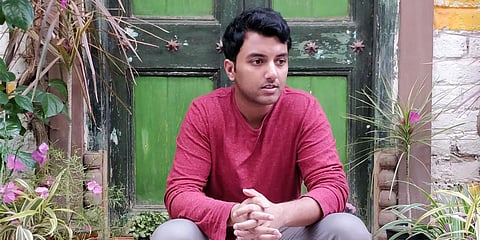

Astaaq Ahmed has always tried to transcend conventional boundaries and explore new ground through his music. The singer-songwriter has been spearheading The Earflower Experiment since 2016 and has dived into multiple genres, frequently blending electronic music and acoustic instrumentation.
His tracks manage to tell riveting tales of disparate elements, often drawing inspiration from his life events. Gurugram-based Ahmed's new song They Can Never See is a collaboration with Bengaluru-based indie music artist Bruce Lee Mani. The song, which launches today, is a commentary on the ongoing socio-political climate that has polarised the nation.
In this edition of Soundscape, Astaaq discusses his collaboration with Mani, his music-making process during the pandemic, and more. Excerpts:
You have always tried to make music across genres. How has this song incorporated your experimental style?
I was writing this song with a different intent. It was meant to be a lot slower, more nuanced, and more 'typical' of my previous writing styles. However, as the night progressed, the song took a different avatar. It was upbeat, packed a mean punch, and was danceable. None of these qualities have shown in any of my previous work, and I am glad with how it panned out.
How was it collaborating with Bruce Lee Mani?
In one word: immaculate. There was this one part in the song, specifically the outro section, which was missing something. No matter what I tried, I couldn't figure it out. That is when I reached out to Bruce. I was half expecting him to say no, given his stature in the indie music space. But the humble man that he is, he agreed to take a stab at it.
The subtle guitar solo he added changed the dynamic of the track without taking away from the essence. His talent and experience shine through in the track's outro, and I couldn’t be more grateful for his help.
This song is a commentary on the political climate. What prompted you to create something like this?
The world has never been this polarised before. There is this general push of nationalistic populism that has taken over the world. Spreading from country to country, this political strategy has allowed many rifts in society. This track tries to accentuate the same concern by outlining the story of a populist.
How was your music-making process during the lockdown? Were there any artists that you looked up to for inspiration?
Music-making during the lockdown was pretty much the same as always. This is primarily because I always made music alone. However, one thing that did occur during the lockdown (at least initially), was the time I got. With a full-time job as a consultant, making music always just had to fit into my day when it could. In terms of inspiration, there are a few; Bruce was right up there with his work produced on social media.
How can music help draw attention to political issues?
I think music has always been a huge proponent of painting quite apt pictures of society, politics, and the times, in general. However, today in India, making songs on such themes is becoming increasingly difficult. Furthermore, the world, in general, has become extremely sensitive. You never know what random word or sentence might trigger outrage or offend someone. In such a situation, many artists consciously decide to stay away. And I don’t blame them.
'They Can Never See' releases today on all major streaming platforms
Song: 'They Can Never See'
Artist: 'The Earflower Experiment'
Featuring artist: Bruce Lee Mani